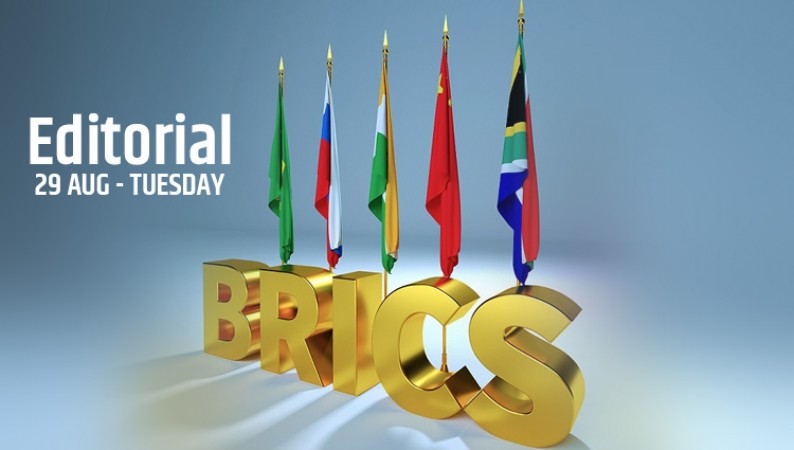
EDITORIAL: In a strategic move set to reshape the global alliance, the BRICS group has announced the inclusion of six new members: Saudi Arabia, UAE, Egypt, Argentina, Iran, and Ethiopia. South African President Sirin Ramaphosa made this groundbreaking declaration at the 15th BRICS Summit convened in Johannesburg, South Africa. These new entrants are poised to formally join the group's ranks come January 2024. While a substantial 23 countries have vied for BRICS membership, the selection process for additional members remains open for further deliberation. As it stands, the alliance comprises Russia, China, India, Brazil, and South Africa.
The resounding endorsement of this expansion by India underlines the shared historical bonds and diplomatic affinities that unite these nations. Prime Minister Narendra Modi lauded this move, asserting the potential for collaborative strides in areas such as space exploration, healthcare, education, and the facilitation of smoother trade flows among member states. With an optimistic gaze, Modi envisions BRICS as a vehicle capable of collectively addressing the world's most pressing challenges.
Amid these developments, Pakistan has expressed an ardent aspiration to join BRICS, a sentiment echoed by Chinese President Xi Jinping during the Johannesburg Summit. Jinping advocated for the inclusion of more developing nations, contending that such an expansion would fortify BRICS. However, India has voiced staunch opposition to Pakistan's entry into the alliance, citing concerns about dilution of the alliance's core objectives and consensus among existing members.
Russian President Vladimir Putin's remote participation in the summit due to an active International Court of Justice arrest warrant related to Ukraine war crimes underscored the significance of the proceedings. The Russian Foreign Minister assumed a physical presence on Putin's behalf. Notable figures, such as Saudi Foreign Minister Faisal Bin Farhan and Iranian President Ibrahim Raeesi, were also in attendance, lending their voices to the deliberations.
BRICS's inception in September 2006 initially saw Brazil, Russia, India, and China coalesce as BRIC. Subsequently, South Africa's entry in 2010 transformed it into BRICS. The collective geographical expanse and population size of these nations—encompassing a quarter of global landmass and 40% of its populace—empower BRICS with the potential to wield substantial influence over the world economic order. It also serves as a counterweight to Western-centric forums like the G7 and the European Union, which have historically marginalized developing economies. Despite India, China, and Saudi Arabia's participation in the G20, this larger forum is perceived to be dominated by Western interests.
A noteworthy development on the BRICS agenda is the exploration of a unified currency as an alternative to the dollar and euro. Historically, the United States has employed economic sanctions, including freezing dollar reserves, to leverage geopolitical conflicts. This often has far-reaching repercussions even on nations not directly involved in the dispute. The prospect of a BRICS currency presents a potential solution. In a prelude to the Johannesburg summit, foreign ministers from BRICS nations met in June and mulled the use of alternative currencies to shield themselves from Western sanctions. The aspirational goal is to forge a robust currency backed by the economic might of Brazil, Russia, China, South Africa, and India, with a comparable strength to the euro. However, India's alignment with Western nations has led it to express minimal interest in the proposed BRICS currency.
India, in a bid to fortify its global economic presence, is strategically pushing for an increased international role of its currency, the rupee. A prime example of this endeavor is the India-UAE bilateral trade agreement conducted in rupees and dirhams. Ongoing negotiations with over 20 nations, including the UK and Singapore, further highlight India's ambition to expand its currency's reach. However, apprehensions loom over the potential disruption that a BRICS currency might pose to this growing momentum of the Indian rupee. External Affairs Minister S Jaishankar has, nonetheless, reiterated India's confidence in its ability to navigate financial crises sans the need for a new currency.
As the BRICS alliance ushers in a new chapter, characterized by fresh entrants and a contemplation of a unified currency, the global power dynamics are primed for transformation. The extent to which these changes will reshape the world order remains to be seen, but the aspirations and actions of these nations are undoubtedly making waves on the global stage.